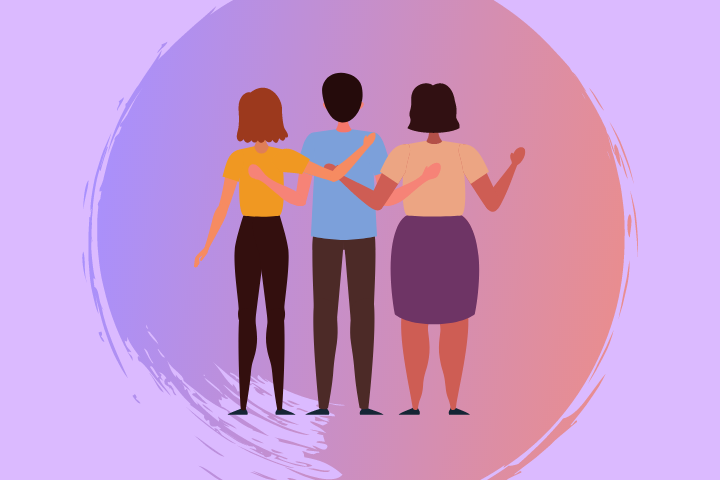
Sexual Assault Can and Does Happen to Everyone: Musings on Serving Male Victims
Monday, April 19th, 2021
In honor of Sexual Assault Awareness Month, we are featuring a blog post from Susheela Varky, Staff Attorney for Domestic and Sexual Violence at the Virginia Poverty Law Center (VPLC). To learn more, visit the National Sexual Violence Resource Center.
Recently, I held a virtual training for advocates about the types of services VPLC provides to survivors of domestic and sexual violence. I gave a disclaimer at the beginning of my presentation that I would be using the pronouns “she/her” to describe survivors or victims and “he/him” to describe abusers.
But the reality is that sexual assault does not discriminate based on gender or sexual orientation. While most of our clients are indeed cisgender, straight women who have been harmed by men they love, we also have cisgender male survivors as clients – some hurt by men and others by women. Despite the word, “Woman,” in the title of the law, the Violence Against Women Act (VAWA), men, too, may be eligible to file VAWA Self-Petitions, a type of visa available to battered spouses of abusive U.S. Citizens or Lawful Permanent Residents (those with “green cards”).
Part of what makes sexual assault so difficult to address is our collective discomfort with talking about it. I recall a training technique where the trainer starts by asking for a volunteer to describe in detail their most recent sexual encounter. The room goes silent. The volunteer usually looks around the room, getting increasingly uncomfortable, wondering how they can escape and why they volunteered in the first place. Before they open their mouths to speak – if they open their mouths – the trainer jumps in to point out how difficult it is to describe a consensual sexual encounter to strangers, let alone sexual violence or unwanted sex to strangers, especially when that sexual assault is committed by an intimate partner.
I have found that most of our clients – regardless of gender or sexual orientation – are more forthcoming about describing physical violence, the manipulative tools their abusers use (e.g., threatening to call ICE to have them deported, taking kids away from them, etc.), or almost anything else over sexual assault.
When we don’t create space to talk about sex or consent, we give more power to confusion, and ultimately shame. Some clients do not know that rape can even be committed by a spouse. In other words, they assume that all sex – even nonconsensual and violent – is part of being married. I heard a story recently, in the context of the need to vet interpreters, about an interpreter who refused to translate the sexual violence the victim described in their native language because “a man cannot rape his own wife.”
For many cisgender male survivors, the stereotypes about masculinity – being strong and not being capable of being victimized, especially by a woman – can make it even harder to reveal that they have been sexually assaulted. One such client who is married to a woman he loves dearly did not even realize his wife’s pressure to fulfill her sexual fantasies was sexual assault. Even when he was uncomfortable with his wife’s increasingly disturbing sexual requests or experienced physical pain from being forced to have sex as frequently as his wife wanted, he did as she asked because he loved her and wanted to please her. Abusers prey on the fact that their partners love them unconditionally and will jump over increasingly high and impossible burdens to please them. It’s about power and control, not love.
Stereotypes are pervasive and affect all aspects of our world, including our ability to understand what our clients, friends, or family have been through. They affect how we come to the table to meet and serve our clients’ needs – and whether we do so with patience and empathy. Sometimes, we have to go on a hunch that there is more to the story than we’re being told. We must remain patient and keep trying to show that we can be trusted with what our clients share with us. If we provide an atmosphere where they may share their full experience – and we are responsible enough to listen actively – we can not only represent our clients well, but we can also help them along the continuum of healing and taking back control of their lives.
Below are a few suggestions on how we may support anyone who has disclosed that they have experienced sexual assault or abuse (from the Rape, Abuse & Incest National Network (RAINN) article, Sexual Assault of Men and Boys):
Listen. Look them in the eye and don’t interrupt. There are many resources about active listening and trauma-informed techniques that can help us be better listeners.
Validate their feelings. Simply stating, “I believe you” or “that sounds like a really hard thing to go through,” can be very helpful for a survivor to hear.
Express concern.
Do not ask about details of the assault.Wait for the survivor to share details. Don’t ask for them. (Disclaimer for attorneys: of course, for our immigration visa statements, details of the assaults are extremely important. Still, patience and developing the bond with our clients will help them feel comfortable sharing more details in the future.)
Provide appropriate resources and referrals. See below for more information.
Resources
For immediate assistance, call the local legal aid office that serves your area or call (866) 534-5243 to contact your local legal aid office.
Virginia Sexual and Domestic Violence Action Alliance
DV Prevention – Virginia Department of Social Services
